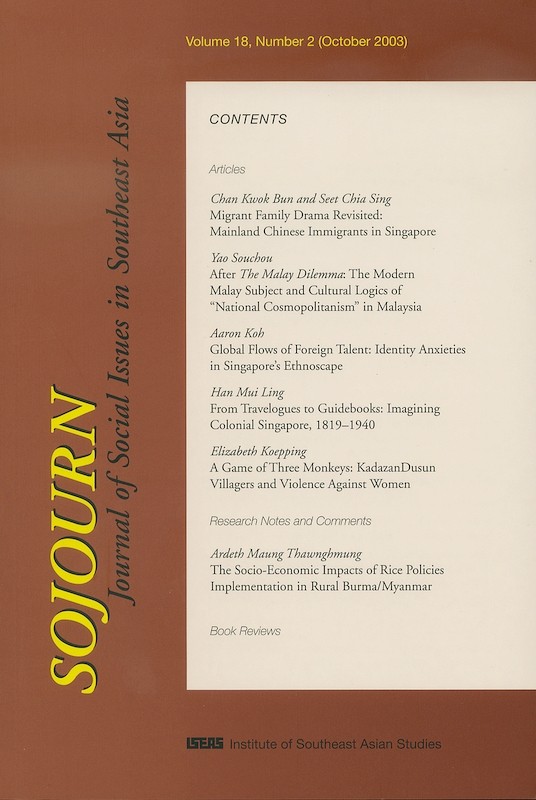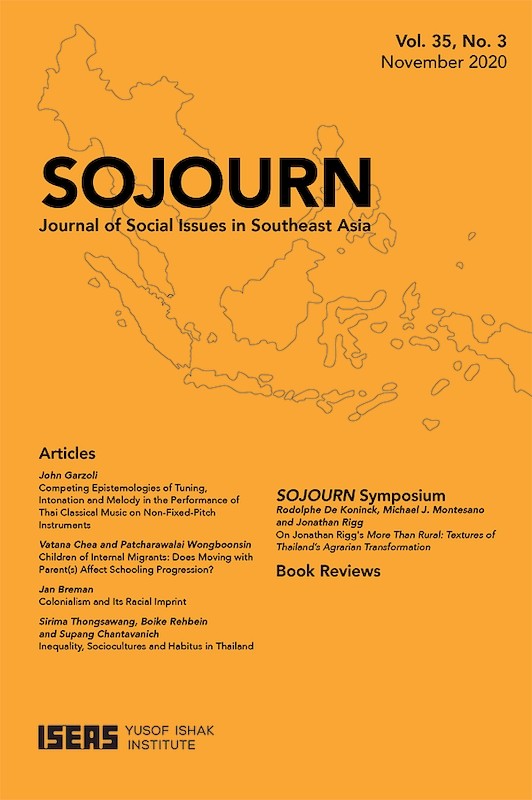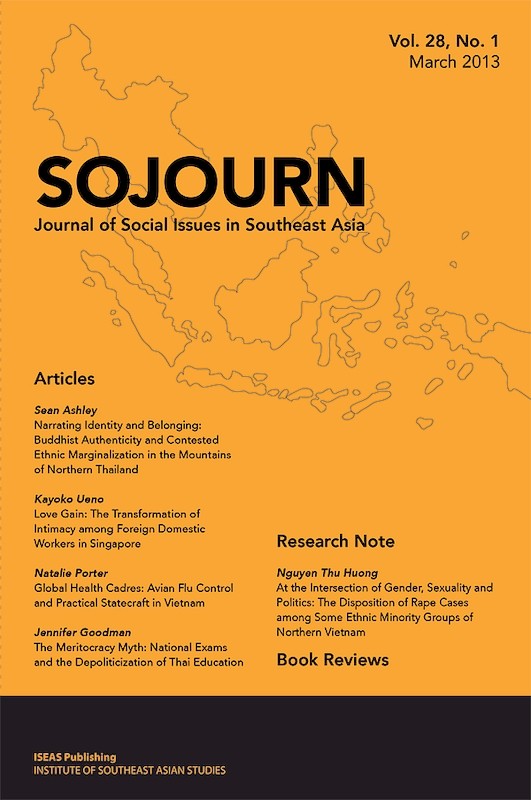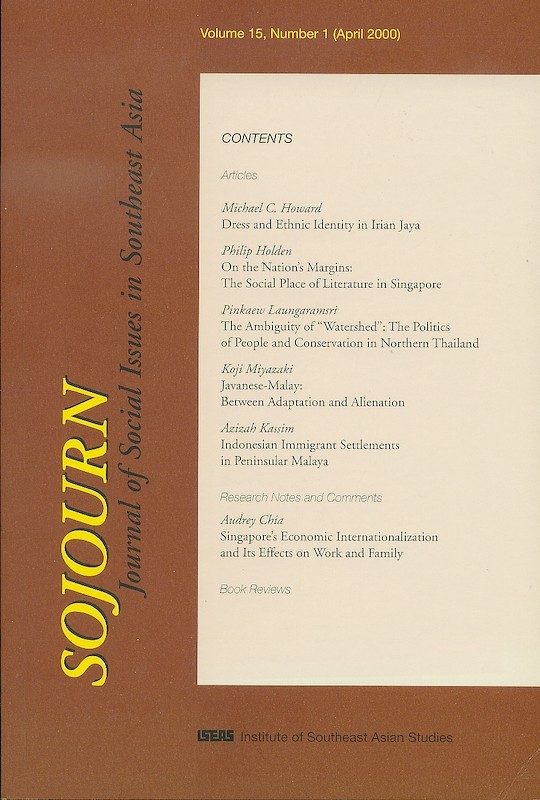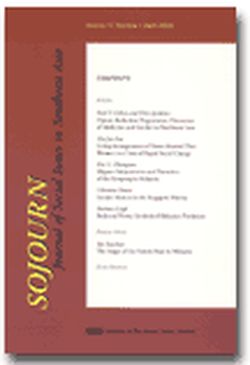SOJOURN: Journal of Social Issues in Southeast Asia Vol. 13/2 (Oct 1998). Special Focus on "Families in Southeast Asia: Facing Fundamental Changes"
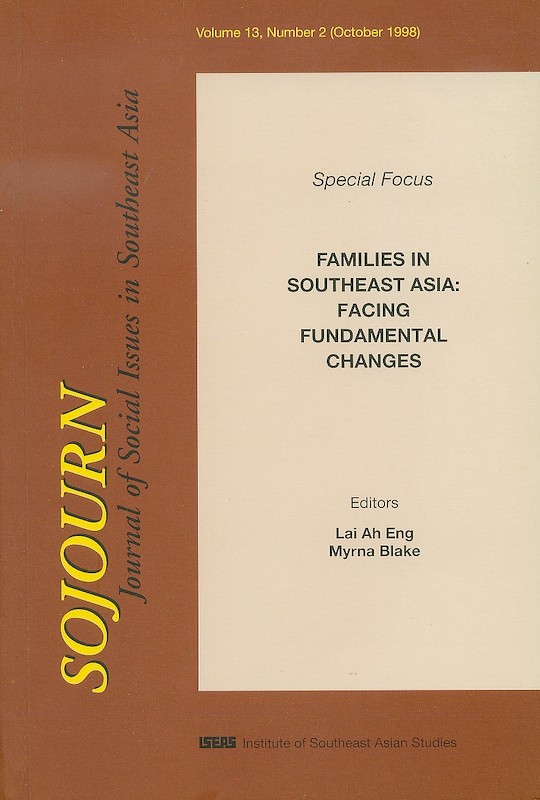
Date of publication:
October 1998
Publisher:
Institute of Southeast Asian Studies
Number of pages:
163
Code:
SJ13/2
Contents
-
Preliminary Pages
-
Introduction
-
The Family Mode of Production and Its Fungibility in Indonesian Transmigration: The Example of Makarti Jaya, South Sumatra see abstractThe analysis of peasant household enterprises and especially the family mode of production form one critical aspect of the study of rural development. The detailed study of households is important for a deeper understanding of the processes of economic survival and of socio-economic differentiation. The current paper focuses on the merits of Liptonâs concept of fungibility within the family mode of production. It explains and critiques this concept within the context of the Indonesian resettlement effort as expressed by the experience of settlers in Makarti Jaya, South Sumatra. Case-studies of two families show how family fungibility may be interpreted and moreover how aspects of state control, gender, and spatiality extend the concept in an empirical situation. It is argued that future research employing this idea in Southeast Asian societies, especially perhaps in a comparative framework, will derive new understanding of the survival strategies and differentiation processes in families and communities in the Third World.
-
The Impact of Labour Migration on the Children Left Behind: A Study of Elementary School Children in the Philippines see abstractAlthough the family in the migration process has been extensively studied, much less attention has been given to the impact of migration on family members left behind. This paper explores in particular the impact on the children, through a research conducted among elementary school children of Filipino migrants. Overall, the impression is that migration is not necessarily disruptive for the development of the children left behind, particularly if it is the mother who remains in the home. The effect depends mostly on the extent of involvement of the extended family in complementing the gaps resulting from parental absence. It is important to provide the family members left behind, particularly the husbands, with adequate training on child rearing, counseling, and different forms of support.
-
Motherhood Redefined: Women's Choices on Family Rituals and Reproduction in the Peripheries of Thailand see abstractThis paper considers changes in the family, especially in the ideology of motherhood and reproduction among the Karen minority ethnic group in the periphery of Thailand as seen through family ritual and birth control and womenâs choices thereof. It analyses how motherhood and reproductive roles are defined in social and cultural processes, especially ritual, and how women are placed at the centre of âtraditionâ through these roles. Such processes are discussed in relation to wider social, economic, and political dynamics. The choices women adopt in negotiating and redefining their motherhood under multiple and overlapping forms of domination are also examined.
-
Delinquent Daughters' Struggle for Autonomy, Morality, Pleasure ... and Motherhood see abstractThis paper attempts to draw together many subjects to investigate configurations in emerging female identities and their interrelations with various aspects of Singapore society and economy. As Singapore women stand at the intersection of a multiplicity of social, political, and economic forces, they do not automatically accept the legitimate definition of self as given to them by the state, parents, and community. By looking at women as they live out their lives in the daily grind of study, work, play, parenting, and caring, this paper hopes to demonstrate the complex connectivity and disjunctures that articulate the macro with the local. It reveals the modern women of Singapore enthusiastically embracing opportunities open to them by the booming economy even as they struggle to manage tensions and sufferings while constituting new roles, morality, and integrity for themselves.
-
Family, Identity, and the Vietnamese Diaspora: The Quebec Experience see abstractThis paper attempts to identify and explain changes in family ethos and practices among the ethnic Vietnamese in Quebec, Canada. Using data drawn from in-depth interviews conducted in 1997 with twenty-one Vietnamese, the analysis focuses on an emerging diasporic space linking family, host society, and Vietnam. Whilst exploring the family-identity link, the analytical gaze is on the age and gender politics of the family. It concludes with a note on the gradual nuclearization and democratization of the Vietnamese family overseas although these processes are not without attendant attempts on the part of members of the Vietnamese diaspora to hold on to certain aspects of the old family form â thus the resultant ambivalence.
-
The "Graduate Woman" Phenomenon: Changing Constructions of the Family in Singapore see abstractIn recent years the Singapore state, as part of its broader population planning policy, has focused attention on encouraging graduate men and women to marry and have children at a younger age. These policies have been promoted through a series of well-publicized advertising campaigns in the television and print media. Tertiary-educated women have been constructed as âproblematicâ within this discourse of state-directed social change because they are marrying later, having fewer children and, on occasion, foregoing marriage or not having children altogether. This paper examines the ways some such women understand the current marriage debate, and the reasons they give for their life choices. I will argue that contrary to popular media and state views, such women have not rejected marriage but rather traditional constructions of gender roles within the family.
- BOOK REVIEW
-
BOOK REVIEW: The Traffic in Women: Human Realities of the International Sex Trade, By Siripon Skrobanek, Nattaya Boonpakdi, and Christina Janthakeero
-
BOOK REVIEW: Untapped Resources: Women in Ageing Societies across Asia. Edited by Kalyani Mehta
-
Index to Volume 13

